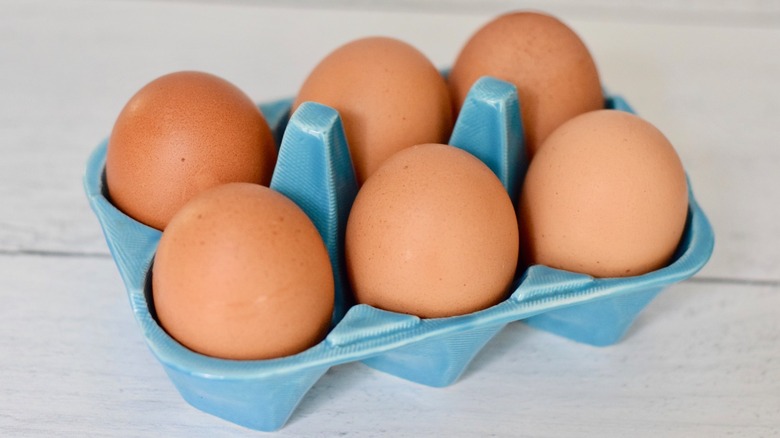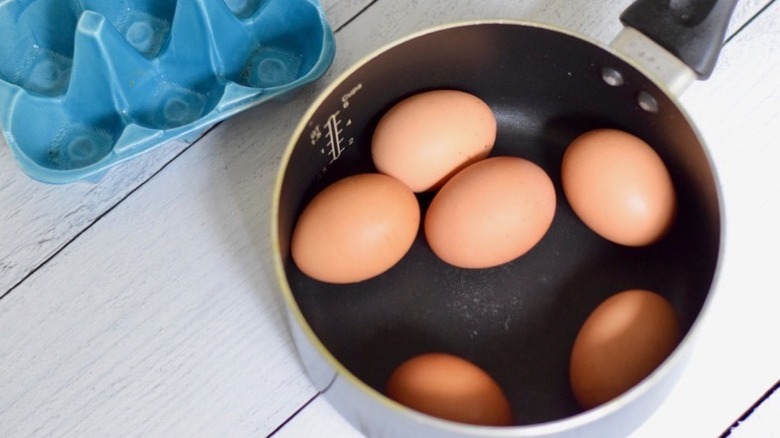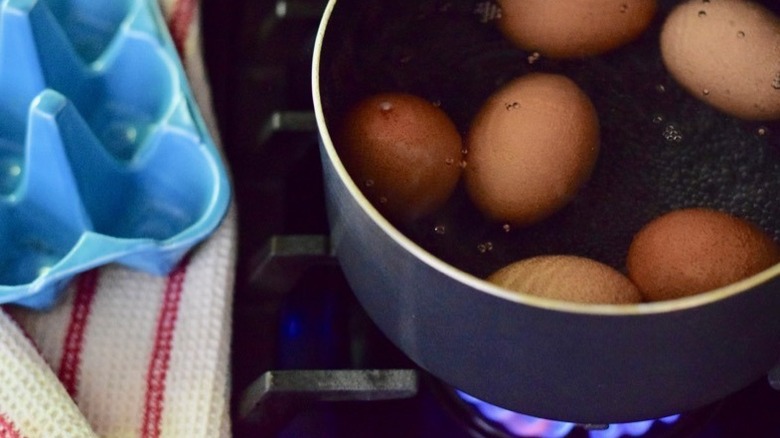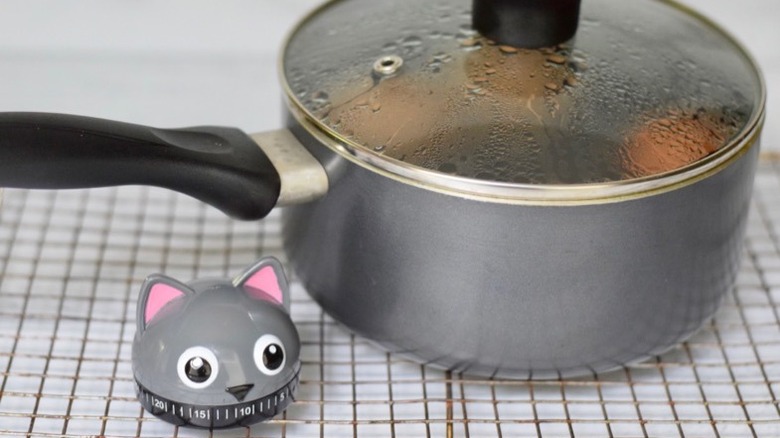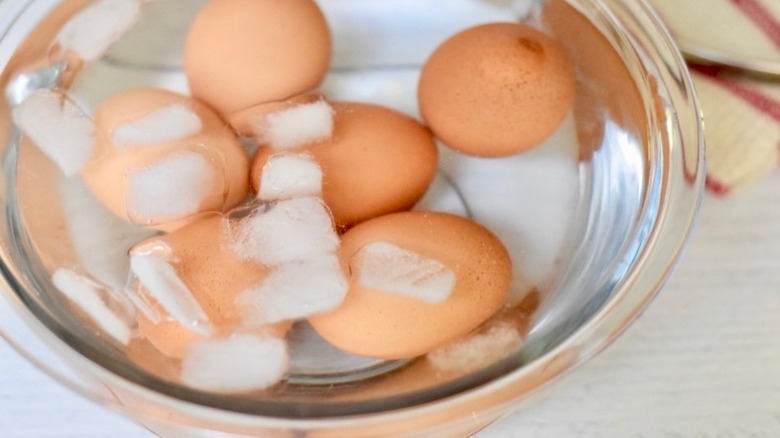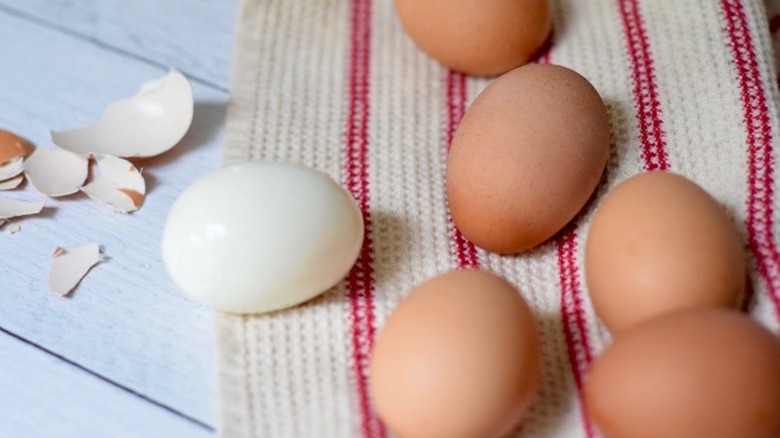How To Boil Eggs
It's an age-old question: what's the best way to boil eggs? It can be extremely frustrating when you put forth the effort to boil eggs and they come out too soft, too hard, with a dark greenish-gray lining around the yolk, or maybe the shells won't even peel off. Whatever problems you've had in the past, consider them left in the past as chef Tara Rylie of RylieCakes walks us through the best way to boil eggs.
First, a word about the type of eggs to use here. You should choose eggs that are not ultra-fresh. We're not saying you need to use the oldest eggs you can find, just avoid the freshest eggs you can get your hands on. Per Kitchn, two things happen when eggs age: the albumen takes on a higher pH level, making the whites adhere less to the shell, ultimately making them easier to peel. And secondly, over time eggs slowly lose their moisture making the air pocket at the base of the egg a bit larger. This will come in handy when we go to crack and peel the eggs.
As for egg storage, you will often want to store your eggs upside down. This will help center the yolk, making for the most beautiful deviled eggs and other visually appealing applications. If you're just boiling eggs to eat for a protein-packed snack or perhaps to make an egg salad, where the eggs will all get chopped up anyway, this step isn't so important.
Place eggs in a saucepan
To start, place six to eight eggs in an empty 2-quart saucepan. Don't go overboard with the number of eggs here, as it's important not to overcrowd your saucepan. You don't want the eggs to collide and crack when boiling, which is made easier when the pot or pan is packed full of them. Ultimately, you want to make sure there is only one layer of eggs and that each egg has a little wiggle room to move around without knocking into its neighbors.
Cold water does the trick
After placing your eggs in a saucepan, fill the pan up with cold water so that there is about one inch of water covering the eggs. Older eggs, which can develop air pockets, may float a little. However, that's okay as long as the majority of your eggs are fully submerged in cold water. Once you've made sure that the eggs are covered by water, place your saucepan over medium heat and bring it to a boil. Allowing the water to heat up from cold to boiling ensures that the eggs cook evenly and thoroughly.
Simmer your eggs
Once your water has come to a boil, count to 30, and then remove your eggs from the heat. Place the saucepan on a wire rack and cover with a lid to keep the heat inside the pan. Let your eggs simmer like this in hot water for 12 minutes for hard boiled eggs. This amount of time will produce eggs with relatively solid, almost chalky yolks. If you prefer hard boiled eggs with softer, creamier yolks, only simmer your eggs for 10 minutes. While you're allowing the eggs to cook, take a few minutes to assemble an ice bath for the next step.
Don't forget your ice bath
When your 10 to 12 minutes are up, immediately transfer your eggs to a waiting ice bath. An ice bath is simply a bowl filled with cold water and a few handfuls of ice. Let your eggs cool there for another 12 minutes.
Ice baths help to stop the eggs from cooking any further. Overcooked hard-boiled eggs often times have greenish-gray circles around the yolk, which is perfectly fine to eat but doesn't look very appealing. It can also smell or taste a bit stinky, as that ring contains sulfur. By stopping the cooking process quickly with the use of an ice bath, your yolks should be sunshine yellow when all is said and done! You will also hopefully skip out on any weird textures that you might find in an overcooked boiled egg, all thanks to a simple ice bath.
Time to dry and peel the eggs
After 12 minutes, remove your eggs from the ice bath and set them onto a clean kitchen towel. Gently dab the eggs with the towel to dry them off. Then, as long as they're fully cooled, you can begin peeling them.
The easiest way to peel hard boiled eggs is to crack them at the base (that is, the wider end of the egg). The base should have an air pocket inside which makes it super easy to remove the shell without digging into the egg white. Start from there and then work your way up the rest of the egg.
If you don't intend to eat your hard boiled eggs right away or turn them into deviled eggs or an egg salad, then it's actually best not to peel them now. The best way to store hard boiled eggs is in their shell in the refrigerator. We like to mark ours with an "X" using a permanent marker so that we can tell which eggs are fresh and which are boiled when they're stored together in the refrigerator. Hard boiled eggs last for one week when stored in their shells in your refrigerator.
Ingredients + Directions
Boiling eggs might seem very simple, but there are a few pointers out there that will make the process even easier. Here is how to boil eggs.
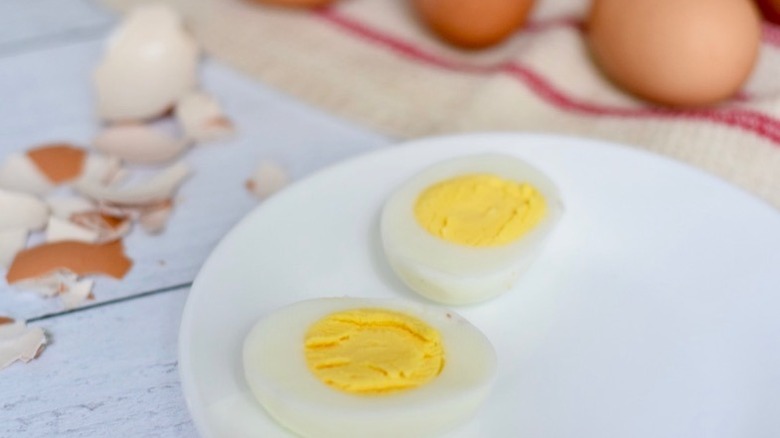
Ingredients
- 6 eggs
- Cold water
- 2-quart saucepan
Directions
- Place eggs in a 2-quart saucepan.
- Fill the pan with cold water, completely covering eggs.
- Bring the water to a boil.
- Once the water has begun boiling, remove the pan from the heat and cover. Let the eggs simmer by sitting in the hot water for 10 to 12 minutes. While you wait, assemble an ice bath in a bowl nearby.
- Remove eggs from the hot water and place them directly into an ice bath. Let the eggs cool in the ice bath for 12 minutes.
- Remove eggs from the ice bath and gently dry. Peel or store depending on what you plan to use the eggs for.
